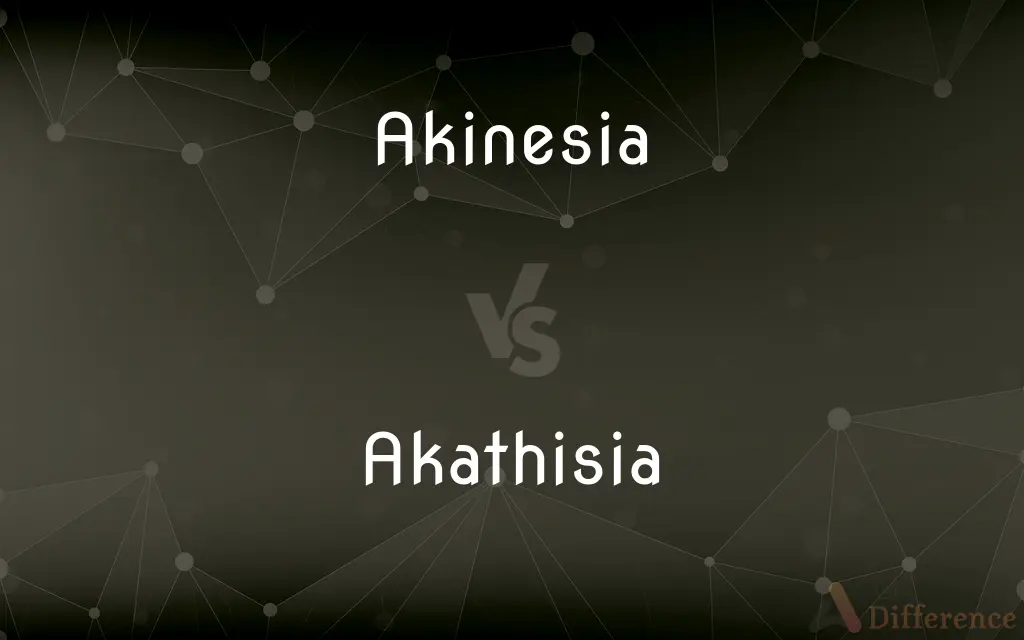Akinesia vs. Akathisia — What's the Difference?
Edited by Tayyaba Rehman — By Fiza Rafique — Published on November 4, 2024
Akinesia refers to the loss of voluntary muscle movement, while akathisia is a state of restlessness and an inability to stay still.

Difference Between Akinesia and Akathisia
Table of Contents
ADVERTISEMENT
Key Differences
Akinesia is a movement disorder characterized by the inability to initiate movement, often seen in Parkinson's disease. It manifests as muscle stiffness and a reduction in spontaneous movement, making everyday activities challenging. On the other hand, akathisia is a condition often caused by antipsychotic medications, leading to a compelling urge to move and an inability to remain stationary, which can be extremely distressing to individuals experiencing it.
While akinesia primarily affects motor function, leading to difficulties in starting or continuing movements, akathisia impacts both physical and psychological aspects, as the constant need to move can lead to anxiety and discomfort. The root causes of these conditions highlight their differences: akinesia is usually a symptom of underlying neurological diseases, whereas akathisia is typically a side effect of medication.
The treatment approaches for akinesia and akathisia also differ. Akinesia, being a symptom of diseases like Parkinson’s, is treated with medications that increase dopamine levels in the brain, such as levodopa. In contrast, akathisia may be managed by adjusting the dosage of the causative medication, switching to another medication, or adding medications that can alleviate the symptoms of restlessness.
Despite their differences, both conditions significantly impact quality of life. Akinesia can lead to difficulties in performing daily tasks and decrease independence, while akathisia can cause severe discomfort and psychological distress, affecting an individual's ability to engage in social and occupational activities.
Akinesia and akathisia are distinct conditions with different causes, symptoms, and treatment approaches. Understanding these differences is crucial for appropriate diagnosis and management, highlighting the importance of tailored medical care for individuals affected by these movement disorders.
ADVERTISEMENT
Comparison Chart
Definition
Loss of voluntary muscle movement.
A condition of restlessness.
Symptoms
Inability to initiate movements, muscle stiffness.
Compulsive movement, inability to stay still.
Causes
Often due to neurological diseases like Parkinson’s.
Usually a side effect of antipsychotic medications.
Treatment
Medications like levodopa.
Adjusting or changing medication, adding treatments for symptoms.
Impact on Quality of Life
Can decrease independence due to difficulty performing daily tasks.
Causes discomfort and psychological distress, affecting social and occupational activities.
Compare with Definitions
Akinesia
A condition characterized by the inability to initiate movement.
Akinesia made simple tasks like buttoning a shirt extremely difficult.
Akathisia
May involve adjusting the causative medication or adding beta-blockers.
Reducing the dose of her medication helped alleviate her akathisia.
Akinesia
Results in muscle stiffness and reduced spontaneous movement.
The most noticeable symptom of her akinesia was her lack of facial expressions.
Akathisia
Often a side effect of antipsychotic medications.
The doctor suggested the akathisia might be due to her antipsychotic medication.
Akinesia
Often involves dopamine-increasing medications.
His akinesia improved slightly after starting levodopa therapy.
Akathisia
A condition marked by an uncontrollable need to move and restlessness.
After starting her new medication, she experienced severe akathisia.
Akinesia
Commonly associated with Parkinson's disease.
As his Parkinson's progressed, his akinesia became more pronounced.
Akathisia
Includes a feeling of inner restlessness and an urge to move.
She described her akathisia as feeling like she was crawling out of her skin.
Akinesia
Significantly affects daily functioning and independence.
Akinesia required him to rely more on assistive devices for mobility.
Akathisia
Can lead to significant distress and impact mental health.
The constant restlessness from akathisia made it hard for him to concentrate at work.
Akinesia
Loss of normal motor function, resulting in impaired muscle movement.
Akathisia
(medicine) A sensation of restlessness characterized by an inability to sit still/down or remain motionless/seated, arising from a subjective need or desire to move, often coinciding with the sensation of twitching of muscles, often as a side effect of psychiatric medications.
Akinesia
(medicine) The loss of the ability to control motor muscles.
Akinesia
Paralysis of the motor nerves; loss of movement.
Akinesia
Motionlessness attributable to a temporary paralysis
Common Curiosities
Is akinesia reversible?
It depends on the underlying cause; in some cases, medication can improve symptoms, but there may be progressive loss of movement in diseases like Parkinson’s.
Can akathisia lead to other health problems?
Yes, the distress and discomfort it causes can lead to anxiety, depression, and significant disruption of daily life.
What distinguishes akinesia from akathisia?
Akinesia is the inability to initiate movements, while akathisia is a state of restlessness and a compelling need to move.
What role does dopamine play in akinesia?
Dopamine deficiency in the brain is a key factor in akinesia, particularly in Parkinson’s disease, affecting movement control.
Can akinesia affect speech?
Yes, it can lead to a decrease in facial expressions and difficulties in starting and controlling speech.
Are there specific tests to diagnose akinesia and akathisia?
Diagnosis is primarily clinical, based on symptoms and medical history, though additional tests may be conducted to rule out other conditions.
Is it common for akathisia to occur after stopping medication?
Yes, akathisia can occur as a withdrawal symptom from certain medications, requiring careful management during discontinuation.
How can one manage the symptoms of akathisia effectively?
Management includes medication adjustments, psychological support, and sometimes, medications specifically targeting restlessness.
Are there lifestyle changes that can help with akathisia?
Physical activity, relaxation techniques, and avoiding stimulants may help manage symptoms, but medical advice should always be sought.
Can akinesia and akathisia occur together?
Yes, it's possible, especially in patients with Parkinson’s disease undergoing treatment that can induce akathisia as a side effect.
Share Your Discovery

Previous Comparison
Mutualism vs. Protocooperation
Next Comparison
Slavic Facial Features vs. Germanic Facial FeaturesAuthor Spotlight
Written by
Fiza RafiqueFiza Rafique is a skilled content writer at AskDifference.com, where she meticulously refines and enhances written pieces. Drawing from her vast editorial expertise, Fiza ensures clarity, accuracy, and precision in every article. Passionate about language, she continually seeks to elevate the quality of content for readers worldwide.
Edited by
Tayyaba RehmanTayyaba Rehman is a distinguished writer, currently serving as a primary contributor to askdifference.com. As a researcher in semantics and etymology, Tayyaba's passion for the complexity of languages and their distinctions has found a perfect home on the platform. Tayyaba delves into the intricacies of language, distinguishing between commonly confused words and phrases, thereby providing clarity for readers worldwide.










































